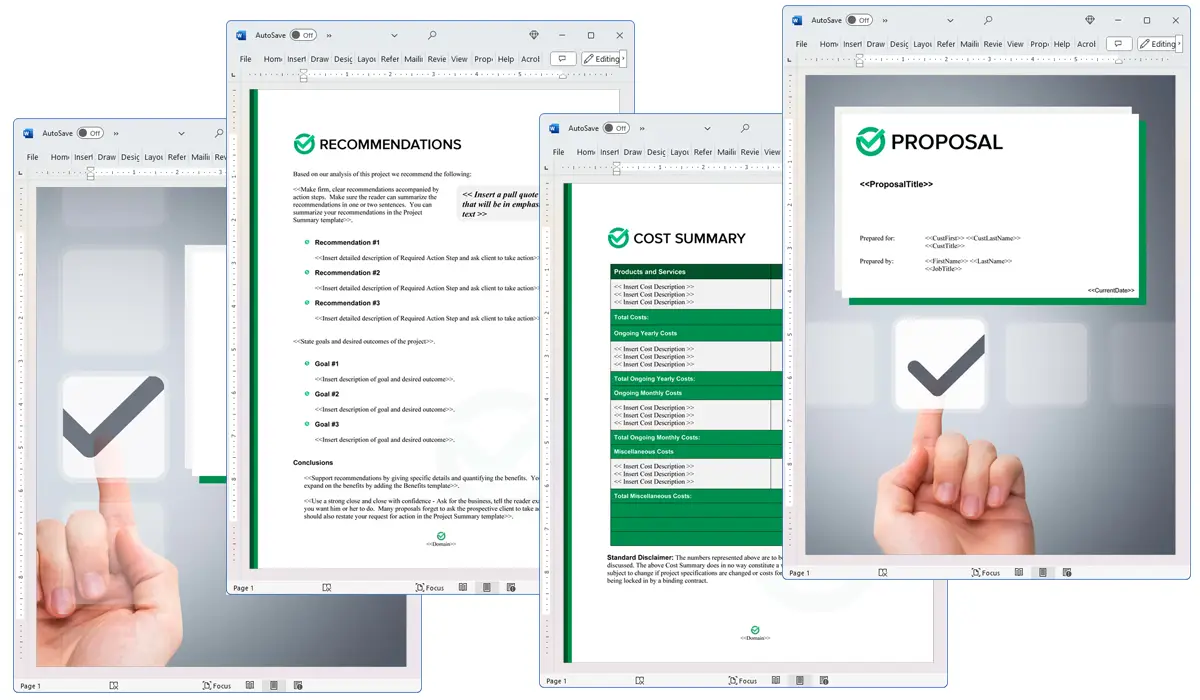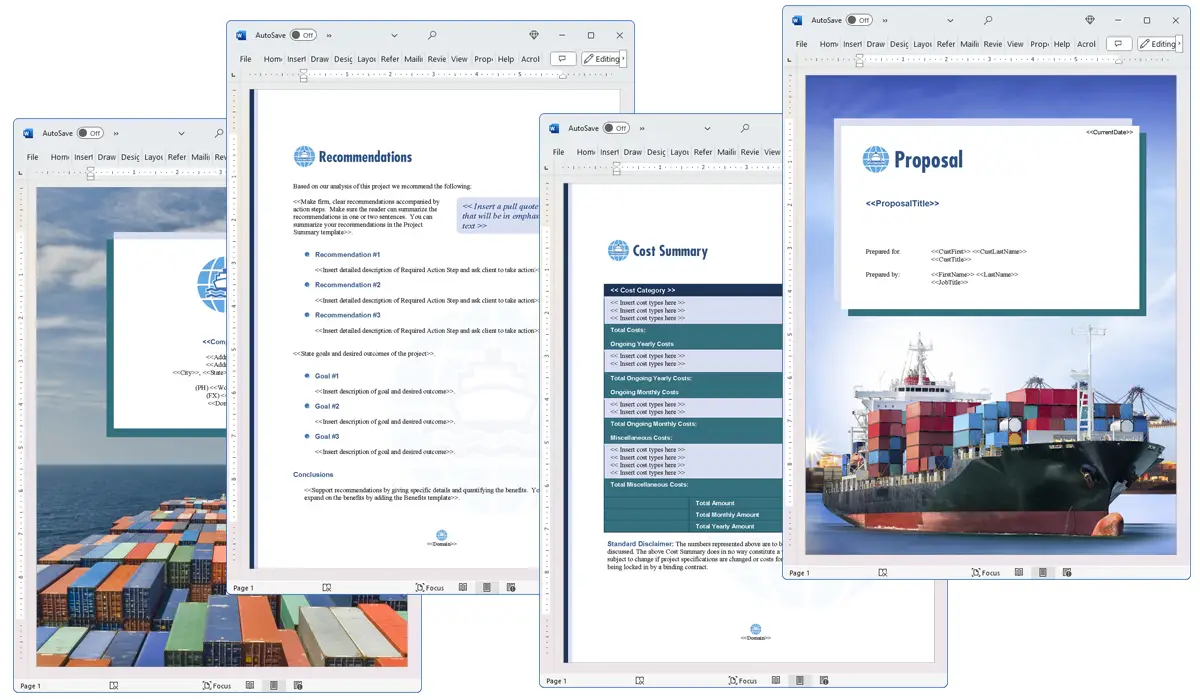What is the Poverty chapter used for?
Proposal Kit Professional Bundle adds more design themes, all six Contract Packs,
a project management library, and Expert Edition software.

Illustration of Proposal Pack Symbols #8
We include this Poverty chapter template in every Proposal Pack, along with thousands more. You assemble this chapter with others in various combinations to create custom-tailored business proposals, plans, reports, and other documents. Proposal Packs apply custom visual designs to the templates, giving the final documents a consistent professional finish.
 DOWNLOADABLE, ONE-TIME COST, NO SUBSCRIPTION FEES
DOWNLOADABLE, ONE-TIME COST, NO SUBSCRIPTION FEES
Overview of the Poverty Chapter
In creating a comprehensive business proposal, discussing the social and economic factors relevant to the project is crucial. The Poverty chapter serves as a specialized section used within various proposal documents to address the issue of poverty and its direct relevance to the proposed activities. This chapter helps in framing the problem, setting the context, and highlighting the importance of the proposed solutions in relation to poverty. It is designed to help businesses and organizations articulate how their proposal will function amid poverty challenges or aim to mitigate such issues.
How is the Poverty Chapter Used?
The Poverty chapter is incorporated into business proposals to provide a detailed analysis of how poverty impacts the objectives and execution of the proposal. It is particularly useful in proposals where the target population is affected significantly by poverty. This chapter helps delineate the scope of poverty and its implications on the project, ensuring that stakeholders understand the gravity of the situation and the necessity of the proposed plan. Whether the project aims to address poverty directly or operates within an impoverished setting, this chapter adds depth and perspective to the proposal, ensuring a well-rounded presentation.
What is Included in the Poverty Chapter?
Typically, the Poverty chapter includes a thorough discussion on:
- The definition and scope of poverty withconsidering the situation of the project.
- Statistical data and research findings to provide a clear picture of the situation.
- An explanation of how poverty affects the stakeholders involved in or affected by the project.
- Discussion of any poverty guidelines used to define the target population.
- Possible challenges that poverty poses to the implementation of the project.
This structured approach ensures that the proposal addresses poverty comprehensively, fostering a deeper understanding among potential clients or funding bodies.
Use Case Examples for the Poverty Chapter
This chapter can be particularly relevant in a variety of proposals, such as:
- Social Initiatives: Proposals aimed at community development or social work often use this chapter to outline how initiatives will specifically aid impoverished communities.
- Community Projects: Local government or non-profits might discuss how community-driven projects can alleviate poverty conditions.
- Faith-Based Proposals: These might explore poverty in a moral and ethical context, proposing faith-driven solutions.
- International Aid: Proposals for international development projects use this chapter to discuss global poverty and targeted interventions.
- Government Grants: When seeking funding, government proposals might need to illustrate understanding and plans to address poverty within their jurisdictions.
- Non-Profits: Non-profit organizations often base their projects around poverty alleviation and require this chapter to articulate their goals and justify funding.
- Addressing Problems/Negatives: Proposals that aim to tackle specific issues like health, education, or unemployment in impoverished areas can benefit from this chapter.
These examples show the versatility of the Poverty chapter in addressing specific needs and contexts within various industries.
Key Takeaways
- The Poverty chapter is crucial for proposals addressing or operating within contexts of poverty.
- It helps articulate the relevance of poverty to the project's goals and methodology.
- This chapter uses data and guidelines to define poverty and its impact on the project.
- It is applicable in various types of proposals, including social, community, faith-based, international, and government initiatives.
- Understanding and properly using the Poverty chapter can significantly enhance a proposal's effectiveness and relevance to potential stakeholders.

Illustration of Proposal Pack Symbols #11
 What Our Clients Say
What Our Clients SayYour product is amazing by the way. It cut down our bid package preparation by at least 5 days. Great product! Don’t think we could do without it, now that we have it."
Double Eighteen Software Group Inc.
 4.7 stars, based on 845 reviews
4.7 stars, based on 845 reviewsRelated Chapters

The Poverty chapter and other chapters are integrated into a Word document as illustrated here in the Proposal Pack Transportation #7 design theme. There are hundreds of design themes available, and every design theme includes the Poverty chapter template.
A proper business proposal will include multiple chapters. This chapter is just one of many you can build into your proposal. We include the complete fill-in-the-blank template in our Proposal Pack template collections. We also include a library of sample proposals illustrating how companies in different industries, both large and small, have written proposals using our Proposal Packs. This template will show you how to write the Poverty.
We include a chapter library for you to build from based on your needs. All proposals are different and have different needs and goals. Pick the chapters from our collection and organize them as needed for your proposal.
Using the Proposal Pack template library, you can create any business proposal, report, study, plan, or document.
 Ian Lauder has been helping businesses write their proposals and contracts for two decades. Ian is the owner and founder of Proposal Kit, one of the original sources of business proposal and contract software products started in 1997.
Ian Lauder has been helping businesses write their proposals and contracts for two decades. Ian is the owner and founder of Proposal Kit, one of the original sources of business proposal and contract software products started in 1997.By Ian Lauder
 Published by Proposal Kit, Inc.
Published by Proposal Kit, Inc.


 Cart
Cart
 Facebook
Facebook YouTube
YouTube X
X Search Site
Search Site